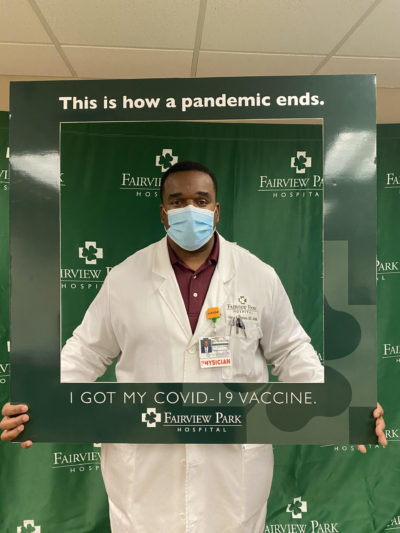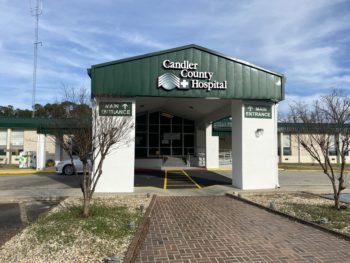A Georgia town’s current status as a COVID hot spot has left its mark on the local hospital.
Dublin, in Middle Georgia, is now listed as No. 7 among U.S. metro areas in per capita rate of COVID-19 infections over the past two weeks, according to the New York Times.

About one-third of Fairview Park Hospital’s 120 patients had the virus as of Wednesday, and all 16 ICU beds were filled, with six of them COVID-19 patients, said Don Avery, the hospital CEO. All medical and surgical beds also were filled, he added.
“Our county and city have had a pretty big rise since a little before Christmas,’’ Avery said. “People are socializing a lot, especially during the holidays.’’
And he noted, “We haven’t seen the full impact of the holiday surge.’’
The state Department of Public Health reported about 10,000 new cases Thursday. It also reported 65 deaths from the disease.
Doctors getting sick
Avery said that despite the current COVID impact, a lower percentage of overall virus patients requires ICU beds.

Still, the burden on Fairview Park’s medical staff has been profound.
“It takes lot more energy to take care of a COVID patient,’’ with staff using personal protective equipment and taking other precautions, Avery said.
Ten physicians serving the hospital have contracted the disease, as have 200 of the 750 employees at the HCA hospital, he said. On Wednesday, 15 employees were out sick with COVID.
“Clearly this has been a long 10 months for the staff,’’ Avery said. “And we haven’t seen the end of it.’’
How much can they take?
It’s difficult to grasp the worsening impact that COVID has on medical facilities in Georgia. More than 5,000 Georgia patients are hospitalized with the disease.
Public health experts in Georgia are clearly worried. A top infectious disease expert, Dr. Carlos del Rio of Emory University, told GHN on Tuesday that he was ‘’very, very concerned’’ about the capacity of the health care system to handle the increasing patient load from COVID. “It is really bad right now and it’s going to get worse,’’ del Rio said.
The COVID admission rate for Georgia is climbing quickly, microbiologist Amber Schmidtke said Wednesday. “The state’s admission rate is 52% higher than the national rate,’’ said Schmidtke, who publishes the Daily Digest, which tracks COVID in the state.
She said for confirmed COVID-19 admissions per 100 beds in the last seven days, Georgia is ranked No. 1, along with Oklahoma.

South Georgia Medical Center in Valdosta treated another record-breaking number of virus-related patients Wednesday. SGMC reported 81 COVID-19 patients hospitalized, the Valdosta Daily Times reported.
Staff in Northeast Georgia Health System emergency rooms are facing a caseload of patients so stark that the workers are treating patients in ambulances until space is found inside the hospital, the Gainesville Times reported Thursday.
“We’re used to having one of the three busiest emergency departments in the state here in Gainesville, but our current situation is unlike anything we’ve ever seen,” said Dr. Mohak Dave, the NGHS chief of emergency medicine. “We’re treating patients in hallways and waiting rooms every day. Sometimes patients have to spend the night there, because there’s no bed available.”
In the past two weeks, Dave said they have had moments where they can’t bring the patient in from the ambulance because of the lack of space in the emergency department. The doctor said the system’s Braselton ER has been under similar strains.
In east Georgia, Candler County Medical Center has its ICU beds filled as well.
Michael Purvis, CEO of the 25-bed hospital, has seen COVID from a unique perspective. He had the virus and its complications for three months, developing pneumonia in both lungs.
Now recovered, he looks at the next four weeks as an ongoing challenge as the post-holiday spike plays out.
With Metter being in a largely rural area, Purvis said, “you don’t see as many masks.’’

On a brighter note, he’s seeing positive effects from new treatments. Antibody treatment has helped people on an outpatient basis, while plasma treatment, along with special oxygen treatment, has aided hospitalized patients, Purvis said.
And Candler County Medical Center has a partnership with Augusta University Health, whose doctors help evaluate each COVID patient at the Metter facility through telehealth.
Purvis said he believes the hospital’s experience with COVID, while terrible, will make it stronger because the staff has gained valuable experience.
He spoke to GHN as Public Health agencies in several parts of the state began offering the vaccine to ordinary people 65 and older.
About those not wanting to take the vaccine, Purvis used his own experience to respond.
“They haven’t seen [COVID] up close and personal,’’ he said. “You’d much rather have the vaccine than catch this virus.”


